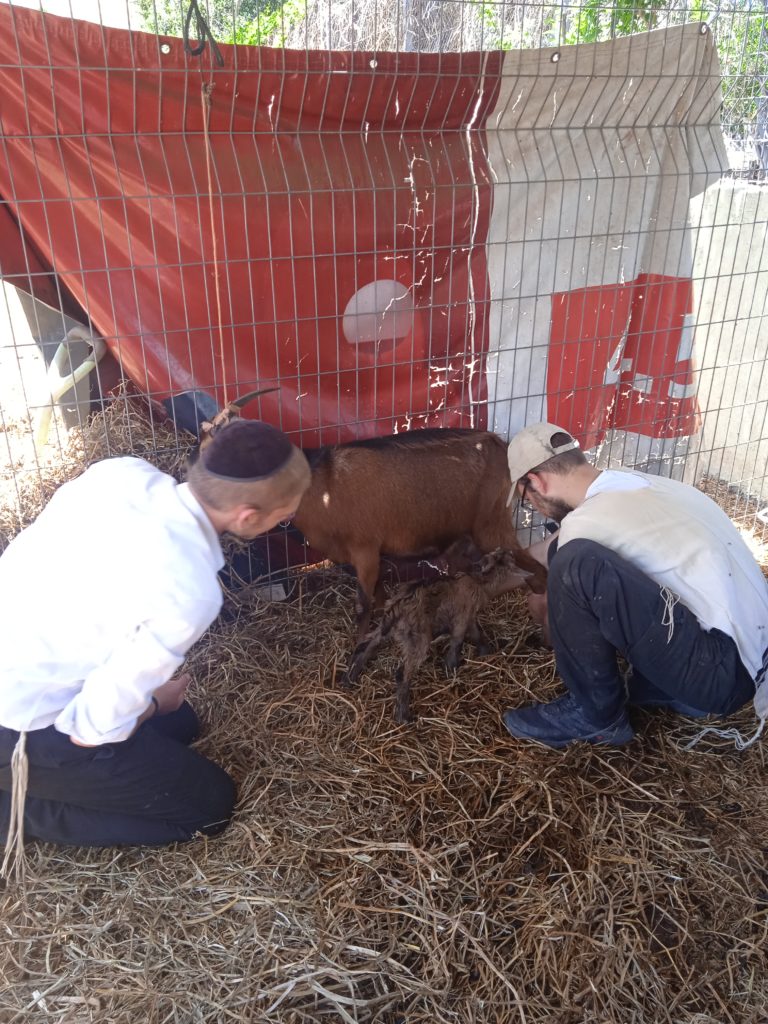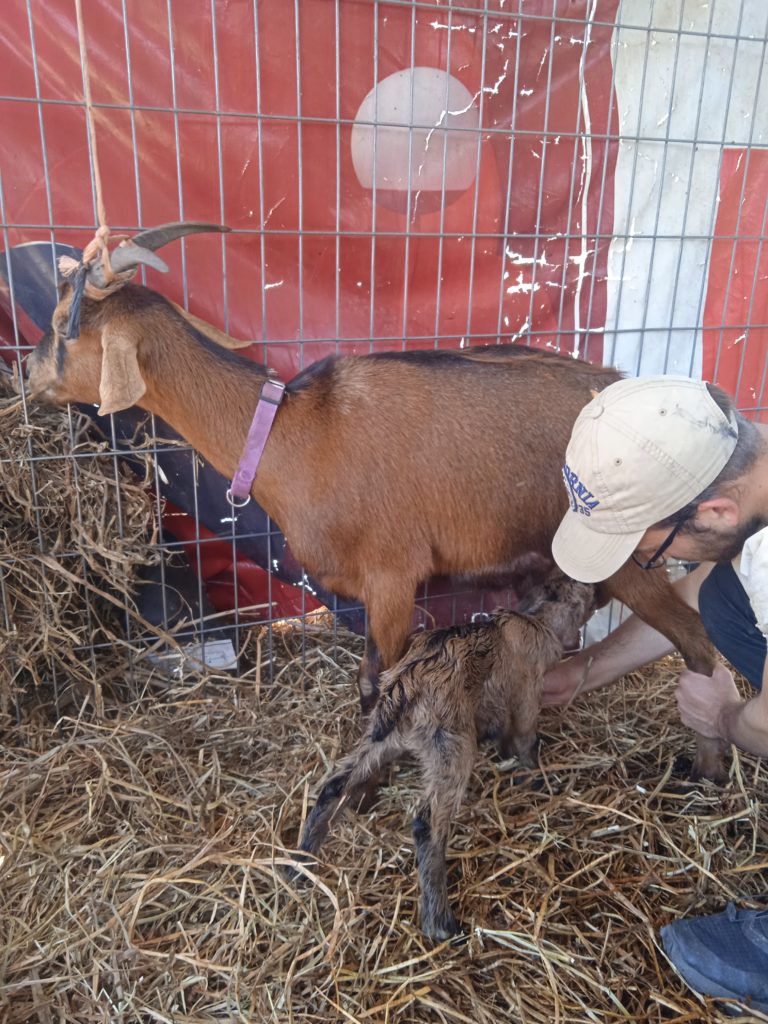Our second goat has given birth! Once again I missed it, this time because I was at the store when it happened.
It was when I was at the store that I got a worried call asking me what to do.
Right after birth, we want to see a mother cleaning off her baby by licking it. She’ll stay close to her baby and protect her – Mocha has a calm and steady temperament, but when another goat comes near her kids – boom! She body slams them against the wall so hard it shakes the roof. She knows and trusts me so when I hold her kids she’ll continue whatever she’s doing without coming over to check on them, but yesterday the twins were with me and as soon as dd6 lifted up one of her babies, she got anxious and came over immediately to nuzzle them.
She’s a great mother and she does all the right things to keep her babies safe and fed.
Brownie is a first time mother, and having a kid of her own is a new experience for her. Brownie doesn’t have any of the right instincts. I wonder if it’s in part because her mother didn’t accept her at birth.
As soon as her adorable female kid was born, Brownie attacked her newborn by head butting her. She didn’t recognize the baby as her own and considered her an intruder. As I arrived I watched as the doeling began to approach her mother, and using her horns, Brownie flung the baby through the air. It was brutal.
This is a really problematic situation because if a mother rejects her baby, the baby will starve to death very quickly. Not to mention she can be injured by the treatment she’s enduring.
If Brownie continued to reject her baby the other options were: 1) encourage Mocha to take the baby on as her own; ironically, Mocha was much kinder to the newborn kid than her own mother. 2) Bottle feed the baby.
I wasn’t interested in bottle feeding if there was any way to avoid it. A baby is always going to do better when nursing from its mother; it’s not just the nutrition in the milk that is important, but the benefit of touch, stimulation and connection. The easiest option was for Mocha to become her adoptive mother but I still believed the best option would be for Brownie to bond with her own baby.
To do that, we needed to get Brownie used to being around her baby and feeding her. Once enough milk has gone through the baby’s system, the smell of the baby will be recognizable to the mother, and once the mother recognizes her baby as her own, she’ll take care of it.
The question was how to bond them, when the baby was in danger any time she was close to her mother.
To address this, one of our boys restrained Brownie’s head so she wouldn’t hit the baby with her horns, and the second held her legs so she wouldn’t kick the baby. This allowed the baby to nurse.
The first time they did this, Brownie’s eyes narrowed and she looked mutinous. As soon as she was released, she tried to attack her baby again.

Two to four hours later, they did it again. This time she was more tolerant. They continued doing this every few hours, and each time Brownie was more calm and stopped actively rejecting her baby.

The second day when I held her baby, Brownie came over to me. I cautiously put the doeling near her face, and instead of butting her, she sniffed her. She turned away after a moment, but when I put the baby down, Brownie didn’t try to attack her. She began to tolerate her baby being in her vicinity, even though she didn’t let her nurse.

Today, two days after we began the bonding process, Brownie allowed her baby to voluntarily nurse, without needing any restraint. The boys kept an eye on them throughout the day to be sure that the baby was nursing regularly, and she was. Now they’re in good shape and we’ll no longer need to intervene in their relationship.
My mind wanders to the experience of human mothers who are disinterested in or apathetic towards their infants.
Erica Komisar has a wonderful book that I highly recommend called, Being There: Why Prioritizing Motherhood in the First Three Years Matters. She writes that when a woman is disinterested in her baby, that’s not natural and it’s a problem that should be addressed rather than excused or justified. Socially we explain that women after birth are hormonal, or to a woman used to the stimulation of the working world or other pursuits a baby is boring in comparison.
Erica Komisar explains that when a woman shows signs of physically or emotionally rejecting her baby, it’s a red flag. While some will say that a mother who isn’t connecting to her child should hand the child over to someone more attentive to care for her, Erica’s belief is that all mothers want to be the best mother she can be and wants her child to have the best chance they can. If the warning signs of disinterest/lack of attachment/depression are present, Erica suggests that more effort should be made to help the mother and baby connect to give them the best chance.
Could something similar to what we did with our goat be done with human mothers who struggle to connect with their infants? Could warm and interactive support in the beginning of the relationship, modeling what to do and how to do it, slowly dropping the support as the mother became more capable, help a mother to attach in a healthy way to her child?
I would think so.
In any event, our goats are all so far doing well. We’re still waiting on one more mother goat to give birth.
Avivah
Sometimes that’s what mothers model for fathers!
Thank you so much for this. I am finding your blog is articulating many things I’ve felt intuitively to be true but have not found words for. It is very validating. Eg some women I know think it’s normal to hate spending time with your baby and positively resent it if other mums don’t feel the same or suggest a mother who is not eager to start childcare has some sort of a psychological problem, is too attached, is a self-righteous martyr etc. I’ve never been able to understand how we think that is a normal or healthy way to see it. I’ve actually bought Erica Komisar’s book, you were the second person to mention it. Thank you!
It’s very unfortunate that nowadays, it’s the mother who is following her healthy instincts who is attacked as being the problem. I don’t think anyone should be criticized but when parents don’t have accurate information about the needs of their children, they can’t make an educated decision about how to meet those needs. Then it’s not just the child and parents who suffer, but eventually all of society. We’re seeing the effects of this lack of maternal nurturing on society right now, with the rampant emotional health disorders, narcissism, borderline personality, all of which are deeply (but not exclusively) affected by lack of nurture a child experiences in the early years.